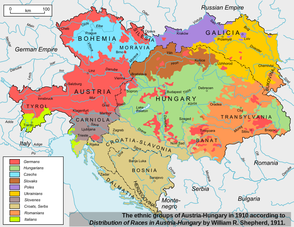 Austria-Hungaria, the multilingual state from which at least two "Zubrowkas" emerged: Czechoslovakia and Yugoslavia.
Austria-Hungaria, the multilingual state from which at least two "Zubrowkas" emerged: Czechoslovakia and Yugoslavia. For a fun look at the fictional world of Zubrowka by the film's creators, have a look at http://www.akademiezubrowka.com/.
|
Wes Anderson’s Grand Budapest Hotel, at this writing poised to win a major Oscar or two, is all about memory, history and nostalgia. Here's my take on the film's European background, with related images from last summer’s trip to Central Europe--and a minimum of spoilers! The film opens in “the former Republic of Zubrowka,” which could suggest any of Austria-Hungary’s successor states. Towards the end of Grand Budapest, Zubrowka is annexed (like the rump Austrian Republic in 1937). The name comes from a Polish bison grass vodka, Żubrówka, and is doubtless a bit of playfulness on Anderson’s part, much like the currency unit “klubeck.” (For a look at socialist-era furniture that smacks of the Grand Budapest’s lobby, see this earlier post.)  Austria-Hungaria, the multilingual state from which at least two "Zubrowkas" emerged: Czechoslovakia and Yugoslavia. Austria-Hungaria, the multilingual state from which at least two "Zubrowkas" emerged: Czechoslovakia and Yugoslavia. Zubrowka, viewers are told, was “once the seat of an empire,” and the film, “inspired by the writings of Stefan Zweig,” could only be referring to one historical state. In the preface to his memoir The World of Yesterday, Zweig writes languidly, “I was born in 1881 in a large and powerful empire, in the monarchy of the Habsburgs, but one cannot find it on the map: it has been washed away without a trace.” The author describes his youth in this land – Vienna in particular, and the various ethnic influences on its culture – his travels in other countries, the outbreak of World War I, seeing the last emperor exiled at the end of that war, and the events leading up to the rise of National Socialism and World War II. Zweig, Jewish and without citizenship, living in Brazil as he completed the book in 1942, particularly lamented the demise of the multinational state of his birth. Hence the nostalgic quality of the film. Wes Anderson’s “Young Author” – who at the end of the film departs for South America - represents Zweig to some degree, as does the concierge, Monsieur Gustave H. “I think his world had vanished long before he ever entered it. But I will say he certainly sustained the illusion with a marvelous grace,” says Young Author of M. Gustave. The elderly former lobby boy, echoing the sentiments of Zweig on what had happened to the Europe of his youth, says, “There are still faint glimmers of civilization in this barbaric slaughterhouse that was once known as humanity. [M. Gustave] was one of them.” The sad end to the story: Zweig was so distraught by his beloved Europe's descent into barbarity that, after completing his World of Yesterday manuscript and mailing it to his publisher in February 1942, that he and his wife committed suicide by an overdose of barbiturates. They were found several days later, holding hands in bed.
For a fun look at the fictional world of Zubrowka by the film's creators, have a look at http://www.akademiezubrowka.com/.
1 Comment
Hailey Garcia
8/7/2024 08:57:34 am
My name is Hailey Garcia and I am from New Jersey. My herpes virus turned to war after 2 years of living with it. I have tried different medical procedures to cure my herpes but to no avail. Most people think herpes is only a minor skin irritation of which herpes has long term effects on health and passes through the bloodstream and can be easily contracted through sexual intercourse. I knew I had herpes from the first day I started feeling itchy in my pubic area and the pain was very unbearable. I couldn't stand it anymore. After 2 years of trying other means to get rid of it, I had to contact Doctor Odunga to help me with a permanent cure. I saw his email and whats-app number from a testimony I read online from a lady who was also helped by him in curing infertility problems, I had faith and contacted him. He assured me of his work and I ordered his herbal medicine. Within 5 days, I didn't feel any pain anymore and within 2 weeks, my skin was all cleared and smooth. I am very grateful to you sir and I write this testimony as others have done to bring those having faith to you sir. If you have herpes or other similar disease and you want it cured, kindly contact Doctor Odunga, Whats-App (wa.me/+2348167159012) OR Email [email protected]
Reply
Leave a Reply. |
Archives
June 2023
Musical & Literary Wanderings of a Galloping GypsyMark Eliot Nuckols is a travel writer from Silver Beach Virginia who is also a musician and teacher. Categories
All
|